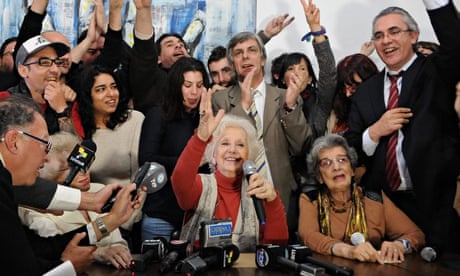The leader of the human rights organisation Grandmothers of the Plaza de Mayo, who found her grandson 36 years after his abduction by the Argentinian military junta, has been congratulated by the country's president, Cristina Fernández de Kirchner.
"She asked me if it was true, I said yes, and we both cried, in the middle of that joyful moment," said Estela Carlotto.
"Today Argentina is a more just country than yesterday," Fernández, who has been a strong supporter of the activists, tweeted later.
Carlotto said she was waiting for the right moment to see her grandson, the 114th missing child to be found by the Grandmothers group, which was established to find the missing children of political opponents murdered by Argentina's military dictatorship in the 1970s.
"I haven't spoken on the phone to him because I don't want to force the situation," Carlotto added. "He's spoken with my daughter Claudia and says he will be coming soon to meet us. Yesterday we took a picture of ourselves and wanted to send it to him, but we didn't want to scare him. I want to meet him, I want to see if he is like I imagined him. But it is a slow process that won't be easy for him."
Carlotto told a press conference on Tuesday she had discovered her grandson, missing for 36 years, thanks to DNA testing. "I didn't want to die without hugging him," she said.
Between 1976 and 1983, about 500 newborns were taken from arrested young opponents of the regime and handed over to military families to be raised according to the "western and Christian values" that the regime claimed to defend. Others were given up for adoption to unsuspecting couples. The real parents were murdered.
Carlotto's daughter had named her son Guido before she was murdered by the military, according to surviving witnesses at the La Cacha death camp where she was held. Until now, he has lived under the name Ignacio Hurban as the son of Clemente and Juana María Hurban, two retired farm workers in Olavarría, a city in the province of Buenos Aires. It is not yet known how the couple came to adopt him.
"We know they are farm people," said Carlotto. "So they must have raised him on the farm, maybe they had no idea."
Ignacio Hurban has raised a family of his own and teaches music in Olavarría. He has had a distinguished career as a fusion musician, mixing classical, jazz and Argentinian folklore musical styles in his work. He has worked as a session musician for some of Argentina's folk music stars, and once with British avant garde saxophonist George Haslam.
On 24 March this year, Hurban posted a song entitled Para la Memoria (To Memory), referring to Argentina's years of dictatorship, on his Bandcamp page, illustrated with an artistic interpretation of the handkerchief worn by the Grandmothers of Plaza de Mayo. "Neither the doors nor the wounds of years gone by have closed," say the lyrics.
In an article he wrote for the daily El Popular this year, talking about his musical work, Hurban pretended he was his dog typing at his computer. "I've heard him say he composes, which I think is something like making a hole where there wasn't anything to start with," he wrote about himself.
He was identified after he presented himself voluntarily at the DNA bank the Grandmothers had set up with the blood samples of all the group's members.
He was born on 26 June 1978 at the military hospital in Buenos Aires. His mother, Laura Carlotto, was 23 years old and two months pregnant when she was kidnapped by the military in November 1977 and taken to La Cacha in the city of La Plata in Buenos Aires province.
The news of his discovery was also joyfully received by his 91-year-old paternal grandmother, Hortensia Montoya. "I can't wait to meet him, to have him near, to hug him, to know that he is my grandchild."
According to some reports, her son Oscar Montoya, Hurban's biological father, was tortured and murdered in front of Laura Carlotto at the La Cacha death camp. Oscar Montoya was also a musician, and had a group called Nosotros y Ustedes (We and You) in his hometown of Cañadón Sec in the southern province of Santa Cruz, where a music theatre was named after him a few years ago.




